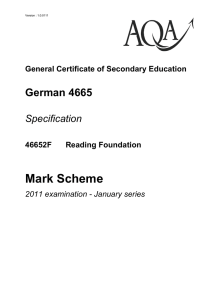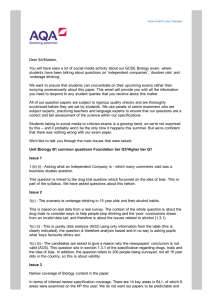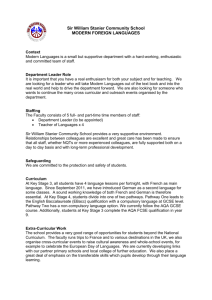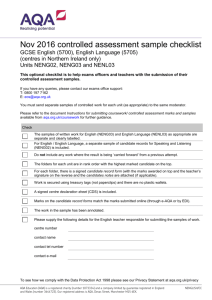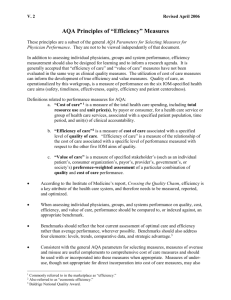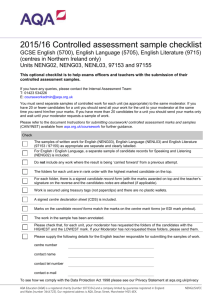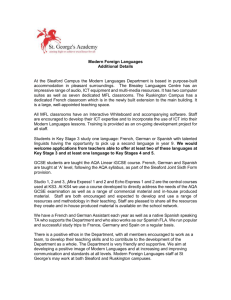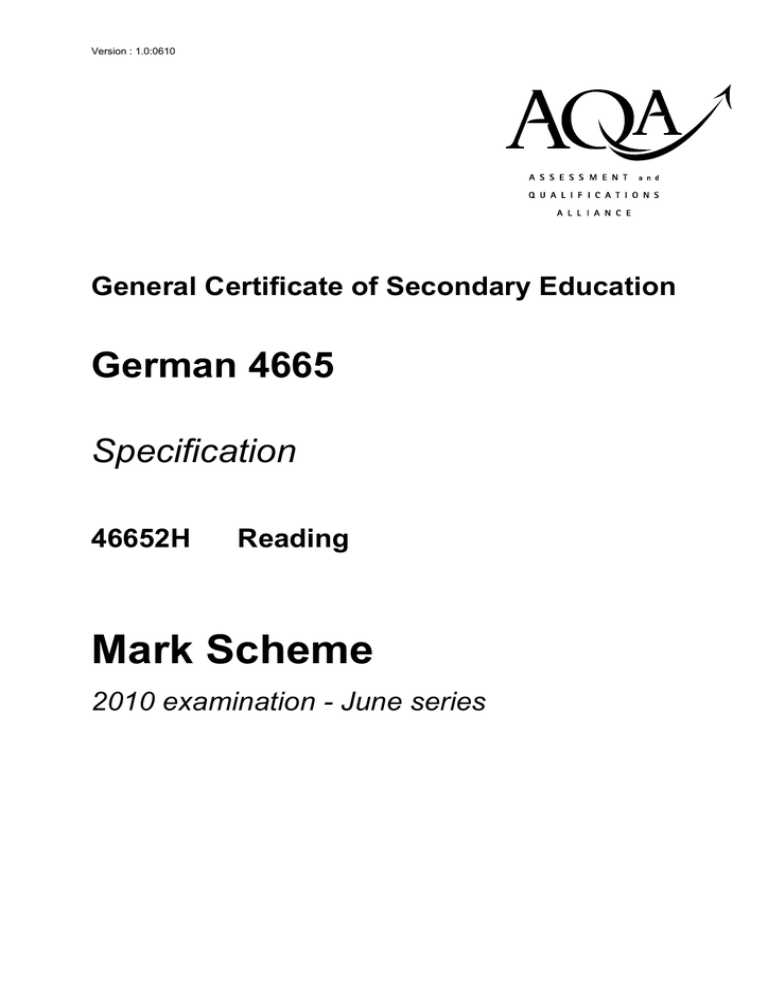
Version : 1.0:0610
General Certificate of Secondary Education
German 4665
Specification
46652H
Reading
Mark Scheme
2010 examination - June series
Mark schemes are prepared by the Principal Examiner and considered, together with the
relevant questions, by a panel of subject teachers. This mark scheme includes any
amendments made at the standardisation meeting attended by all examiners and is the scheme
which was used by them in this examination. The standardisation meeting ensures that the
mark scheme covers the candidates’ responses to questions and that every examiner
understands and applies it in the same correct way. As preparation for the standardisation
meeting each examiner analyses a number of candidates’ scripts: alternative answers not
already covered by the mark scheme are discussed at the meeting and legislated for. If, after
this meeting, examiners encounter unusual answers which have not been discussed at the
meeting they are required to refer these to the Principal Examiner.
It must be stressed that a mark scheme is a working document, in many cases further
developed and expanded on the basis of candidates’ reactions to a particular paper.
Assumptions about future mark schemes on the basis of one year’s document should be
avoided; whilst the guiding principles of assessment remain constant, details will change,
depending on the content of a particular examination paper.
Further copies of this Mark Scheme are available to download from the AQA Website: www.aqa.org.uk
Copyright © 2010 AQA and its licensors. All rights reserved.
COPYRIGHT
AQA retains the copyright on all its publications. However, registered centres for AQA are permitted to copy material
from this booklet for their own internal use, with the following important exception: AQA cannot give permission to
centres to photocopy any material that is acknowledged to a third party even for internal use within the centre.
Set and published by the Assessment and Qualifications Alliance.
German - AQA GCSE Mark Scheme June 2010 series
READING & LISTENING TESTS
Notes on the Marking Scheme
Non-verbal Answers
Follow the mark scheme as set out.
Verbal Answers
1.
The basic principle of assessment is that candidates should gain credit for what they
know, understand and can do. The following guidance should be borne in mind when
marking.
(a)
Credit should be given for all answers which convey the key idea required
intelligibly and without ambiguity. A separate assessment of spelling,
punctuation and grammar is not required on these papers because of the nature
of the answers. However, these aspects are an integral part of assessing
communication and marks cannot be awarded where errors in spelling,
punctuation or grammar lead to a failure to communicate the required information
without ambiguity.
(b)
(c)
Where a candidate has given alternatives or additional information in an answer,
the following criteria should be applied:
if the alternative/addition does not contradict the key idea or make it
ambiguous, accept;
if the alternative/addition contradicts the key idea or makes it ambiguous,
reject.
Where numbered lines are given within a question/section of a question, credit
should be given for correct answers, no matter which line they appear on.
(d)
Where a question has more than one section, a candidate may include as part
of the answer to one section the information required to answer another section.
For instance, the information required to answer section (b) might be given as
part of the answer to section (a). In such cases, credit should be given for having
answered section (b), provided that no incorrect answer has been given for that
section in the correct place.
(e)
Where a question or part of a question carries more than one mark, candidates
are given credit for all the correct answers they give, even if they have given
incorrect answers as well, except where any of the latter contradicts a correct
answer that they have given.
2.
...../..... means that these are acceptable alternative answers. (.....) means that this
information is not needed for full marks.
3.
In questions where candidates are asked to name, for example, three types of vegetable
sold in the market, only the first three items they write down should be considered.
4.
Accept
T/F/?
Target language equivalent as instructed in rubric (eg. V/F/PM)
/X/?
a mix and match approach using the above, where the response is clear and
unambiguous (eg. T and are both used by the candidate).
5.
In multiple choice questions where candidates must choose one letter or number, they
should automatically get no mark awarded if they give more than one. If the rubric
instructs them to write one letter or number in the box and they do so, but write a second
letter or number outside the box too, then the answer in the box should be considered.
6.
No mark scheme can cover all possible answers. When in doubt:
look for the key idea, where this is appropriate.
-
NFP = no further penalty
3
German - AQA GCSE Mark Scheme June 2010 series
GCSE Reading – Higher Tier
Question
1
Accept
Mark
Notes
Three of:
Open the whole year
Parking spaces always right outside
Reject: Car park
(alone)
Menu in English and French
Children’s portions / small portion of
every meal €5
3
Children’s play area
Reading area / copies of
international newspapers
Question
2 (a)
Accept
3 (a)
3 (c)
Notes
1
Accept
Mark
T
Notes
1
Accept
Mark
H
Notes
1
Accept
Mark
H
Question
3 (d)
Mark
P+N
Question
Notes
1
Accept
Question
3 (b)
Mark
P
Question
Notes
1
Accept
Question
2 (c)
Mark
N
Question
2 (b)
Reject: Newspapers
(alone)
Notes
1
Accept
Mark
T
1
4
Notes
German - AQA GCSE Mark Scheme June 2010 series
Question
3 (e)
Accept
H +T
Question
4
Mark
Notes
1
Accept
Mark
BDF
Notes
3
(any order)
Question
5
Accept
Mark
In the following order:
4
GFHA
Question
6 (a)
Accept
6 (b)
6 (d)
7
Mark
G
Mark
A
8 (a)
Question
8 (b)
Notes
1
Accept
Mark
C
Notes
1
Accept
Mark
BEGH
Notes
4
(any order)
Question
Notes
1
Accept
Question
Notes
1
Accept
Question
6 (e)
Mark
B
Question
Notes
1
Accept
Question
6 (c)
Mark
D
Question
Notes
Accept
Mark
Annoyed / in a complaining (bad)
mood
1
Accept
Mark
He has to clean up (outside the
building / before work)
1
5
Notes
Reject Bad
Notes
German - AQA GCSE Mark Scheme June 2010 series
Question
8 (c)
Accept
Mark
Notes
Two of the following:
Bottles
Beer cans
1
Cigarette packets
Waste food
NB: 2 items required for 1 mark
Question
8 (d)
Accept
More than half an hour
Question
8 (e)
Mark
Some of the rubbish is under the
stairs / in the bushes
Accept
Mark
On Mondays / after the weekend
Mark
8 (g)
How the young people come to have
so much money
1
Question
Accept
Mark
9 (a)
They are going to come and check
more often
9 (b)
Question
10 (a)
Notes
Notes
1
Accept
Mark
A
Question
Notes
1
Accept
Question
Notes
1
Question
8 (h)
Notes
1
Accept
Question
8 (f)
Mark
Notes
1
Accept
Mark
C
Notes
1
Accept
Mark
They have planned to do a lot
(during the day) / They want to see
as much as possible
1
Question
Accept
Mark
10 (b)
Jonas is too old for the family ticket /
has to buy his own ticket
1
5
Notes
Notes
German - AQA GCSE Mark Scheme June 2010 series
Question
10 (c)
Accept
Mark
He’s a keen photographer / he can
take lots of photographs
1
Question
Accept
Mark
10 (d)
Spend the whole day on the water
playground / would like to buy a cap
1
Question
Accept
Mark
10 (e)
Question
10 (f)
Question
10 (g)
Question
10 (h)
Notes
Hot
Notes
Notes
1
Accept
Mark
On the afternoon walk
Notes
1
Accept
Mark
It’s too expensive
Notes
1
Accept
Mark
Whether they will make / can afford
a second visit
Notes
1
Higher Paper Total = 45 Marks
5

